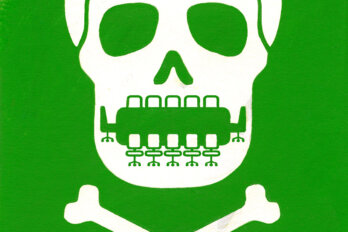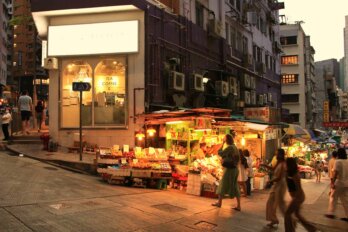In 2021, Rihanna’s makeup empire officially earned her the title of billionaire. My Twitter feed, usually full of anticapitalist accounts—ones that routinely decry the exploitation of Amazon workers and post “eat the rich” comments every time Jeff Bezos breathes—overflowed with joy. “Rihanna Is the Only Billionaire Allowed to Exist,” proclaimed the headline of a Refinery29 essay by Tayo Bero. I felt that same joy—at least initially—when Beyoncé partnered with Tiffany & Co. to become the fourth person, and first Black person, to wear one of the world’s largest yellow diamonds. But, like many other Black women, I also felt a certain hesitation.
Particularly in Beyoncé’s case, the criticism was swift. “Sorry, Beyoncé, but Tiffany’s blood diamonds aren’t a girl’s best friend,” read the headline of an op-ed by the Washington Post’s Karen Attiah. The Tiffany ad does not “celebrate Black liberation,” she explained, it “elevates a painful symbol of colonialism” and “presents an ostentatious display of wealth as a sign of progress in an age when Black Americans possess just 4 percent of the United States’s total household wealth.”
This is a system that is satisfied with the status quo but sprinkles “representation” on top. It’s what praises Jay-Z when he sits during the US national anthem at the Super Bowl (widely regarded to be a political statement, which he later denied) but still goes on to partner with a racist NFL. Like Attiah and others who criticized the Tiffany campaign, I believe the celebration of Black capitalism could lead to further exploitation of my community. Now, after Pharrell Williams hinted at a partnership with Tiffany in January, I find myself wondering how long it will take us to learn this lesson once and for all.
I grew up in Jamaica, where the divide between classes is stark. I knew that people who were well off—or even middle class, like my parents—had better prospects in life. My private school education meant I would likely go to a better high school than my friends next door, who lived in poverty by comparison. My parents emphasized that we should be grateful because we were “more fortunate” than those around us.
At the same time, I was taught to admire rich, successful Black women. In the late ’90s and early 2000s, my mother and I watched The Oprah Winfrey Show as often as we could. Even at an early age, I knew I wanted to be a journalist, just like Oprah was in the beginning of her career. She was, and still is, the richest Black woman in the world. She was born into poverty and turned her years of television into a media empire. To many, Oprah Winfrey is Black excellence personified.
But my life soon turned on its head when I moved to Pickering, Ontario. My parents’ education and work experience back home were hardly recognized here. We were practically starting from scratch, going to food banks and thrifting for winter clothes. My parents worked hard, I got a job during high school, and still things were tight. I didn’t understand why our hard work wasn’t paying off.
Until I turned seventeen, around the time I got my first job, I knew two things to be true: life is a white man’s game, but also, you could definitely pull yourself up by the bootstraps. And so, I pulled. But nothing happened. I began to question why that was—and why some white people seemed to have an easier time becoming successful. The answer to both, I soon realized, was capitalism.
In a way, I can understand why we cling so hard to the stories of our fellow Black people thriving. There’s an element of representation there. If Rihanna, for example, could make it out of a small Caribbean island to become the queen of makeup, skin care, and lingerie, then so could anyone.
But this way of thinking ignores the fact that the wealth enjoyed by the upper echelons of society has been built on our backs. From transatlantic slavery to segregation to the prison industrial complex—all of these things were designed to prevent us from succeeding.
“We have been deliberately deprived,” says El Jones, an assistant professor at Mount Saint Vincent University and former poet laureate of Halifax. As a result of centuries of deliberate state deprivation of every form of well-being, including wealth, such as the ability to get a mortgage, Jones explains, Black people have not been allowed to accumulate capital. “Because we as a people have not had those things, it is very normal for people to aspire to.”
It may be normal to dream of the things that are deliberately kept from us, but it is different to want to integrate into the same system that has kept us down. There is no capitalism without racism. And that, Jones explains, is by design. Modern capitalism got its start during the transatlantic slave trade. White enslavers were able to acquire vast amounts of wealth, and their currency was Black people. “Black people are fundamental labour that underlies the capitalist system,” says Jones. “The logics of slavery were imposed on us . . . that we don’t have souls, that we don’t feel the heat—all those logics used to justify the use of our labour and exploitation.”
To illustrate this point, let’s go back to that Tiffany diamond, which many consider to be a blood diamond. It was found in South Africa’s Kimberley Mine in 1877, then sold to Charles Lewis Tiffany, who went on to become one of the most successful jewellers in the US. All the while, Black people were (and still are!) working in dangerous conditions, for very little pay, in various African diamond mines.
As for Rihanna’s billionaire status, which was largely built on her Fenty Beauty line, there’s a significant amount of exploitation going on there too. Many makeup products use mica, a group of minerals that are mined. Fenty in particular has been accused of using mica mined by children in India.
Celebrating these achievements instead of examining them is also a distraction from the ways in which the system is not working for us. “This idea that all we need to do is keep the same system and just inject ourselves into it,” says Jones, “does nothing to disrupt power relations. It does nothing about social hierarchies. It does nothing to conflict any of that.”
Another example of the limits of representation is former US president Barack Obama. “Obama could be president, but Africa was not liberated,” Jones says. “People continued to go to prison. The wealth gap continued to increase. Anybody who sort of believed in this idea that all we needed to do was just get more Black representation—that should have been blown to smithereens by what we experienced in the Obama administration. But people continue to really cling to this idea.”
So, if Black billionaires, presidents, or celebrities won’t save us, what will? Jones says everything that has been withheld from us systemically, the things we so long to achieve, can be ours through mass organizing. “Black people as a collective have been successful when we’ve collectively organized.” This is especially true when it comes to mutual aid. Earlier this year, when I was down on my luck, I was able to raise over $8,000 through mutual aid to take care of myself and my partner. While it is unfortunate that I even needed to do that to cover rent, medications, and therapy, I was able to turn to my community, and my community was able to rally around me.
Stories like this are all too common on the internet, where many people have had to ask their communities and well-meaning strangers for help in their daily lives. It is just further proof that the systems we live under are not meant to be traversed alone.
“Part of the problem is the way the state doesn’t teach us and uses amnesia about our history,” explains Jones. “People start to believe things like ‘Martin Luther King Jr. just had charisma; he just marched.’ People believe that Rosa Parks just got tired and didn’t want to move. And they don’t understand that she had a long history of organizing. So organizing history is really hidden from us on purpose.”
Along with our histories being obscured, I think a feature of capitalism is to make us too tired, busy, numb, or all three to push back against the way things are. The uprisings that took place in 2020 happened in large part because of the COVID-19 pandemic. People were at home watching white supremacy in action. We weren’t too bogged down by work schedules to go attend protests. We were spending more time online, seeing others in need of mutual aid. We created Facebook groups dedicated to “caremongering.” It was a glimpse into what society could look like.
We don’t have to look to Beyoncé’s or Rihanna’s wealth and status as an example of what we could be. We are already on the verge of creating the world we want. Through caring for our neighbours, protesting, organizing, and putting pressure on the elites, we can remake society into something fair, just, and beautiful.






